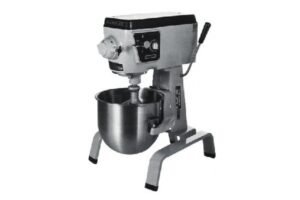
First time customers receive my commercial cake donut training series when you order over $200. Learn scratch cake donut making by an expert.
First time customers receive my commercial cake donut training series when you order over $200. Learn scratch cake donut making by an expert.

Planetary Mixer
There are several options when deciding which industrial dough mixer is best for your donut or bakery business. I never give advice unless it’ saves you money and serves a real-world purpose.
In my experience. The best solution when first acquiring dough mixers is to consider you really need 2 mixers. When first starting out in the donut business. I recommend a 20-quart mixer needed for mixing smaller dough and batters and a 60 – 80-quart dough mixer for mixing larger poundage’s.
In this way should your primary mixer break down, you will have a backup mixer. Also, the 20-quart mixer is ideal for formulating new recipes. If you are on a strict budget, I recommend a 60-quart dough mixer with a bowl adapter reducer to accommodate a 20-quart mixing bowl.
I always recommend refurbished Hobart mixers because accessories and parts are readily available.
What you need to understand about mixing yeast donut dough. A 60 quart dough mixer can effectively only mix 50 pounds of dough. If you try and mix more than 50 pounds the dough will climb up the dough hook and the dough will not be thoroughly mix. This stands true for all mixers i.e 40-qaurt can effectively mix 30 pounds of yeast donut dough. The exception is mixing donut glazes and icings.
A 30-quart dough mixer can mix 74 pounds of donut glaze (50 lbs. powder sugar and 24 pounds h20). Purchasing a dough mixer is like buying a car, I recommend checking the manufacture date and serial number. This will give you great leverage when purchasing a used refurbished mixer as you will know all the particulars.
Here at donutequipmentsales.com we have you covered. We meticulously review all donut equipment for persons who have purchase the donut equipment research service or donut equipment package, prior to us recommending used robust equipment for sale.
Spiral Mixer
The most typical commercial dough mixer seen in bakeries all over the world. A stainless-steel bowl and interchangeable attachments including a dough hook, spiral, and whisk should always be included with these mixers. Because exact dough weights vary greatly, these mixers are typically described and sized based on their bowl volume rather than capacity.
The majority of artisan bread bakers choose spiral mixers because of their capacity to reduce the amount of heat added to yeasted doughs and to properly establish gluten structure without overworking the dough. Spiral mixers, however, are more expensive, and as you gain expertise using a planetary mixer – you will not over mix yeast donut dough.
When using a spiral mixer, the stainless-steel mixing bowl and spiral dough hook are rotated simultaneously. This allows the rest of the dough in the bowl to rest in between kneadings while only little portions of dough are mixed at a time. With a relatively big margin for error for overmixing, this design also tends to enable fairly quick development of the dough.
DISCLAIMER: This content is provided for informational purposes only and is not intended as legal, accounting, tax, HR, or other professional advice. You are responsible for your own compliance with laws and regulations. You should contact your attorney or other relevant advisor for advice specific to your circumstances.
Whether you’re opening a new restaurant, expanding your concept, or renovating within your existing four walls, you’re going to need capital to make it all happen.
In this guide to restaurant financing and restaurant loans we will walk you through what restaurant financing is, restaurant financing options to consider, and how to compare and evaluate restaurant financing options.



Don’t miss our HUGE Discounts!
We won’t spam you, we promise.
United states, Colorado.
© Copyright 2022, donutequipmentsales